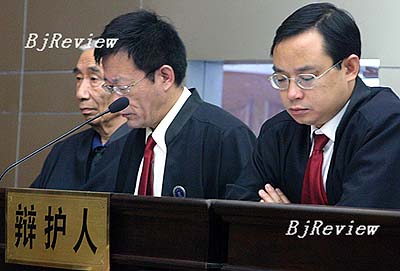|

A change to China's 11-year-old Law on Lawyers is set to empower the country's legal profession. The amendment to the law, which will come into effect on June 1 next year, will allow individuals to open a law firm, improve access to clients and enable lawyers to build a case more easily.
Lawyers in China have traditionally lacked power and this has hampered development of the industry. The amendment could change this and lead to rapid growth in the profession.
"Though it leaves something to be desired, the amended law is big progress in general," said Tang Feng, Secretary General of the Jiangxi Lawyers Association, based in Jiangxi Province.
Disputed subject
Chinese lawyers have long complained of difficulties in meeting criminal suspects and getting access to files and evidence when defending criminal cases.
It's been a long disputed subject as to when a lawyer can intervene during criminal proceedings. China's Criminal Procedure Law rules that during detention a suspect is entitled to hire a lawyer but the lawyer can't enjoy the status of a defense attorney. Also, lawyers find it difficult to enter the judicial procedure as they have to obtain the approval of a court or procuratorate to meet with suspects.
But according to the amendment, lawyers, provided they have the requisite papers, such as a legal practitioner certificate, are entitled to meet criminal suspects or defendants in person once judicial organs have finished their initial interrogation or taken mandatory measures. Also, defense attorneys and criminal suspects will not be monitored when they have a conversation, the amendment said, and defense lawyers are entitled to look up all files and materials relating to a case.
Effectively, the amendment has empowered lawyers to defend their clients while in detention, said renowned lawyer Gu Yongzhong.
The improved access to communicate with clients will give lawyers more time to build a defense case, said Chen Weidong, a law professor at Renmin University of China, who took part in amending the law.
The revised law also states that lawyers are entitled to look into and copy lawsuit papers and technical appraisal materials from the beginning of a case.
"Such an article will further guarantee lawyers' rights to look into files and papers relating to a case," said Yang Minglun, Deputy Director of the Legal Affairs Committee of the National People's Congress Standing Committee.
"Hence lawyers will obtain more evidence than before. Judicial organs should listen to their opinions in a wider range, especially the evidence they come up with, which could lead to an innocent verdict or reduction of a penalty," said Nie Jianhua, an official with the Supreme People's Procuratorate.
Currently, lawyers in China face severe restrictions. In order to seek evidence from a witness, they have to ask that person's permission. In murder cases, they are required to obtain permission from judicial organs to investigate the relatives of the victim.
The amendment gives lawyers two options during a case. Either they can ask judicial organs to conduct the investigation or the lawyer himself can investigate.
Beaten
Aside from the resistance they encounter during legal proceedings, lawyers are also concerned about their own rights and safety. In recent years there have been cases in which lawyers have been beaten, held in custody illegally and even jailed. The profession is considered a dangerous job in China.
According to China's Criminal Law, lawyers can face a sentence of three to seven years if they help a client fake or destroy evidence, or threaten or seduce them to change their testimony.
"The law fails to clarify the meaning of ‘seduce' so lawyers in criminal cases can easily be accused of seducing or faking evidence," said Beijing lawyer Jiang Xiaoyang, adding that lawyers face a risk of being framed, especially when they challenge the interests of the police.
The All-China Lawyers Association has conducted a study of 23 cases of perjury by lawyers and found that in 11 cases the lawyers had been found not guilty. In this regard the amendment has endowed them greater protection against legal action.
"Legal exemption on the part of the lawyers is quite important to them when they are doing their job," said another lawyer Yin Zhengyou in Beijing.
Under the amendment, if a lawyer is detained or arrested on criminal charges involving a lawsuit, the judicial organs should inform the family of the lawyer, the law office he works for and the lawyer association he belongs to within 24 hours, adding another protective shield.
Still controversial
The new law follows the old management system, in which judicial and administrative departments have the right to supervise and guide lawyers, law firms and lawyers' associations, while lawyers' associations manage lawyers and law firms on the basis of the law.
Under this system, management of the legal industry is subject to the attitude of judicial and administrative organs, and the functions of lawyers' associations are limited. For example, the associations have to refer to judicial departments if they make rules and regulations on the legal industry.
Lawyers' associations only have the soft power to punish lawyers. When it comes to economic penalties, money has to go to central finance via local judicial and administrative departments.
Normal punishments should be the responsibility of the associations, while serious punishments like revoking a certificate to practice should go to the judicial and administrative departments, according to Professor Chen Guangzhong at the China University of Political Science and Law.
Other experts also suggest that there should be some regulations included in the amendment to restrict the ability to limit lawyer's rights. Otherwise, the powerful judicial and administrative departments will retain the real power and lawyers will only gain power on paper.
| 